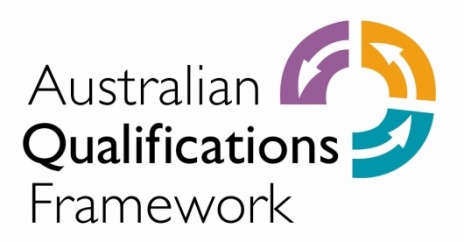AQF Qualifications

The Australian Qualifications Framework (AQF) is the system used to categorise all nationally recognised qualifications in schools, vocational education and training and higher education.
This helps to ensure that the training provided and results given to students are consistent throughout Australia.
In the VET sector, all qualifications are based on the achievement of competency standards. This sets them apart from the Schools sector and Higher education sector. The table below shows how the VET qualifications fit into the overall AQF system.
Education sectors and qualifications
| Schools |
| Senior Secondary Certificate of Education |
| Vocational Education and Training (VET) | |||
|---|---|---|---|
| Certificate I (AQF 1) | Certificate II (AQF 2) | Certificate III (AQF 3) | Certificate IV (AQF 4) |
| Diploma (AQF 5) | Advanced Diploma (AQF 6) | Vocational Graduate Certificate (AQF 8) | Vocational Graduate Diploma (AQF 8) |
| Higher Education | |||
|---|---|---|---|
| Diploma (AQF 5) | Advanced Diploma (AQF 6) | Associate Degree (AQF 6) | Bachelor Degree (AQF 7) |
| Graduate Certificate (AQF 8) | Graduate Diploma (AQF 8) | Masters Degree (AQF 9) | Doctoral Degree (AQF 10) |
Summary of VET sector qualifications
Below are brief summaries of the eight qualifications available under the VET system. These summaries are adapted from the descriptions provided on the Australian Qualifications Framework website.

For more details on the qualification levels shown below, as well as descriptions of the other qualifications available under the Australian Qualifications Framework, go to the AQF website
Certificate I (AQF 1)
Graduates at this level will have knowledge and skills for initial work, community involvement and/or further learning, including:
- foundational knowledge for everyday life, further learning and preparation for initial work
- foundational skills to undertake defined routine activities, and identify and report simple issues and problems
Certificate I graduates should be able to demonstrate autonomy in highly structured and stable contexts and within narrow parameters.
Certificate II (AQF 2)
Graduates at this level will have knowledge and skills for work in a defined context and/or further learning, including:
- knowledge of a defined area of work and learning
- skills to undertake defined activities and provide solutions to a limited range of predictable problems.
Certificate II graduates should be able to demonstrate autonomy and limited judgement in structured and stable contexts, and within narrow parameters
Certificate III (AQF 3)
Graduates at this level will have theoretical and practical knowledge and skills for work and/or further learning, including:
- knowledge of a specific area of work and learning
- skills to complete routine activities and provide solutions to predictable and sometimes unpredictable problems.
Certificate III graduates should be able to demonstrate autonomy and judgement, and take limited responsibility in known and stable contexts within established parameters.
Certificate IV (AQF 4)
Graduates at this level will have theoretical and practical knowledge and skills for specialised and/or skilled work and/or further learning, including:
- knowledge of a specific area or a broad field of work and learning
- skills to complete routine and non-routine activities and provide solutions to a variety of predictable and sometimes unpredictable problems.
Certificate IV graduates should be able to demonstrate autonomy, judgement and limited responsibility in known or changing contexts and within established parameters
Diploma (AQF 5)
Graduates at this level will have specialised knowledge and skills for skilled or para-professional work and/or further learning, including:
- knowledge in a specific area or a broad field of work and learning
- skills to analyse information to complete a range of activities, provide solutions to sometimes complex problems, and transmit information and skills to others
Diploma graduates should be able to demonstrate autonomy, judgement and defined responsibility in known or changing contexts, and within broad but established parameters.
Advanced Diploma (AQF 6)
Graduates at this level will have broad knowledge and skills for para-professional or highly skilled work and/or further learning, including:
- knowledge of a specific area or a broad field of work and learning
- skills to analyse information to complete a range of activities, interpret and transmit solutions to unpredictable and sometimes complex problems, and transmit information and skills to others.
Advanced diploma graduates should be able to demonstrate autonomy, judgement and defined responsibility in contexts that are subject to change, and within broad parameters to provide specialist advice and functions
Vocational Graduate Certificate (AQF 8)
Graduates at this level will have advanced knowledge and skills for professional or highly skilled work and/or further learning, including:
- knowledge in one or more disciplines or areas of practice
- skills to analyse, generate and transmit solutions to complex problems, and transmit knowledge, skills and ideas to others.
Vocational graduate certificate graduates should be able to demonstrate autonomy, well-developed judgement, adaptability and responsibility as a practitioner or learner.
Vocational Graduate Diploma (AQF 8)
Graduates at this level will have advanced knowledge and skills for professional or highly skilled work and/or further learning, including:
- knowledge in one or more disciplines or areas of practice
- skills to analyse, generate and transmit solutions to complex problems, and transmit knowledge, skills and ideas to others.
Vocational graduate diploma graduates should be able to demonstrate autonomy, well-developed judgement, adaptability and responsibility as a practitioner or learner.
Packaging rules
The packaging rules for a qualification specify which competencies are core units, that is, mandatory for the qualification, and which are available as 'electives'. Electives are generally categorised into groups, with a minimum and maximum number permitted from each group.
The packaging rules also specify how many elective units can be 'imported' into the qualification from other Training Packages, and what conditions apply to selecting these units.

Go to 'Training.gov.au' and look up a qualification you are familiar with. Have a look at the Packaging rules and answer the following questions:
How many units must a person be assessed as competent in to successfully complete the qualification?
What is the total number of core units that must be completed?
What is the total number of elective units that must be completed?
How many electives may be imported from other qualifications?
What other conditions apply to the use of imported electives?

